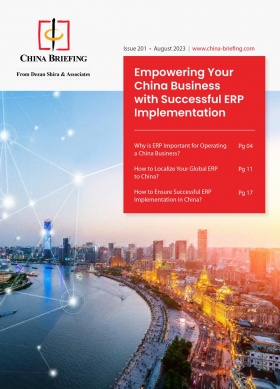Key Points in the Application of Chinese Labor Laws to Foreign Employees
Foreign employee management has become one of the top concerns for many companies. Hiring expatriates is very different from hiring domestic employees. In this article, Allan Xu, Director of Business Advisory Services Shanghai Office, and Victoria Li, International Business Advisory Shanghai Office explain the “special features” that apply to foreign employees in labor relations management.
With expatriates working in China becoming more common, how to effectively manage foreign-related relations has become one of the top concerns for many executives.
Compared to the management of domestic employees, foreign-related labor relations are more complicated. On the one hand, the employment of foreign personnel involves administrative procedures that are different from general labor relations. On the other hand, foreign-related labor relations are limited by a series of special legal norms. Moreover, foreign employees generally have higher salaries, which means that once a labor dispute arises, the cost will inevitably be higher than average.
Given these circumstances, companies have been paying growing attention to legal provisions related to foreign employee management, to avoid legal risks and prevent labor disputes to the greatest extent.
In this article, we introduce the “special features” that apply to foreign employees in labor relations management.
A work permit and a residence permit are mandatory for hiring expatriates
In addition to a written labor contract, to legally work in China, a foreign employee must obtain a work permit and a residence permit. Only in this way, an expatriate will be deemed to have established a labor relationship in China and be protected by the Chinese labor laws.
Without a work permit and residence permit, the provision of labor to a company in China means the expatriate is illegally employed, which may lead to penalties for both the company and the foreign employee.
Should a dispute arise between the foreign employee and the employer, it falls out of the scope of labor arbitration and will be subject to other general laws and regulations.
Accordingly, the following procedures shall be strictly followed when hiring foreigners:
- Step 1: Applying for a “Notification Letter of Foreigner’s Work Permit in China”. Before a foreigner enters China, the prospective employer shall first apply for a Notification Letter of Foreigner’s Work Permit in China for the foreigner. Only after obtaining approval and the notification letter may the company hire the foreigner.
- Step 2: Apply for a work visa. The foreigner who has been approved to come to China for employment shall apply for a work visa (Z-visa or R-visa) at the Chinese embassy/consulate abroad on the strength of the Notification Letter of Foreigner’s Work Permit in China and other required documents.
- Step 3: Apply for a “Foreigner’s Work Permit in China” (work permit). Within 15 days after the entry of the employed foreigner, the employer shall apply for a work permit for the foreigner.
- Step 4: Apply for a residence permit. The foreigner who has applied for a work permit shall, within 30 days after entering China, present the work permit to the Bureau of Public Security to apply for a residence permit.
In practice, a foreigner who enters China with a work visa also needs to go to the designated medical institution for a physical examination first, and only after passing the physical examination can he/she apply for a work permit. It should be noted that the above procedures for hiring foreigners are also applicable to foreigners who are sent by foreign headquarters to work in China but do not sign contracts with Chinese entities.
If a company in China employs foreigners without following the stipulated procedures, the company will not only have to terminate the foreign employee but also face a fine between RMB 10,000 and RMB 100,000. The company will also bear all the costs for repatriating the illegally employed foreigners.
The expatriates working in China without a work permit or a residence permit may be fined between RMB 5,000 and RMB 20,000, in addition to being terminated. In some extreme cases where the situation is serious, the foreigner could also be detained for a period of 5 days to 15 days, or even be ordered to leave China within a time limit.
There are strict restrictions on the use of foreign interns
Under relevant Chinese laws, employers can only recruit foreign students who are studying in universities in China as interns. In addition, for a legal internship, foreign students should obtain the consent of their schools and go to the exit-entry administration agency of the Bureau of Public Security to complete the internship endorsement procedures.
That is to say, foreigners who have graduated and foreigners who are not studying in universities in China cannot work in a company in China under an internship agreement.
Foreign employees are prohibited from labor dispatch, business outsourcing, and cross-region part-time work
According to the relevant laws and regulations of China, the employer of a foreigner working in China must be consistent with the employer indicated on his/her work permit.
This indicates that foreign employees cannot be recruited through labor dispatch and business outsourcing, under which the employees work for companies other than the employers indicated in the labor contract.
On the other hand, it also means that foreign employees shall only provide labor in the region where the employer is based. Accordingly, employees are not allowed to take part-time jobs across regions.
Once the employer changes, the work permit and residence need to be renewed
Since the employer must be consistent with the one indicated in the work permit, foreigners who change their employers need to go through the formalities for changing their work permits and residence permits promptly.
Both the old and new employer should actively assist in the changing procedures. Otherwise, the old and new employers would likely constitute illegal employment. This would lead to legal responsibilities such as a fine of up to RMB 2,000.
Non-fixed-term labor contracts do not apply to foreign employees
Article 17 of the Regulations on the Administration of Employment of Foreigners stipulates that the term of a foreign employee’s labor contract shall not exceed five years. That is, non-fixed term labor contracts (also referred to as open-ended labor contracts) cannot be applied to foreign employees.
If it is necessary to renew the expatriate’s labor contract, the enterprise shall renew the labor contract only after obtaining the approval of the local labor administrative department and completing the procedures for the extension of the work permit within 30 days before the expiration of the original labor contract.
Foreign employees’ social insurance payments can be exempted under bilateral social insurance exemption agreements
Foreign employees working in China have been required to participate in China’s social insurance scheme starting from 2011 when the Ministry of Human Resources and Social Security (MOHRSS) released the Interim Measures for the Participation in Social Insurance of Foreigners Employed in China. However, since social insurance is managed at the regional level, a range of inconsistencies exist among cities.
Foreign employees are also eligible for social insurance exemptions if they come from countries that have social insurance exemption agreements with China.
To date, 12 countries have reached such agreements with China and 11 such agreements have been implemented between China and the following countries: Germany, South Korea, Denmark, Canada, Finland, Switzerland, the Netherlands, Spain, Luxembourg, Japan, and Serbia. China has signed agreements with France, but it is not yet in effect.
The exemption scope and qualifications may vary from one agreement to another, and the local social insurance bureaus may have different policies toward the implementation of the exemptions. Employers should consult and apply with the local bureau in charge before they decide not to contribute to their foreign employees.
Notably, expatriates are generally not required to contribute to the housing fund scheme. Nevertheless, many cities allow foreigners to make housing fund contributions voluntarily. This is a measure to attract talent.
Judicial practice may allow mutual agreement on “termination conditions” with foreign employees
According to Article 21 and Article 22 of Administrative Provisions on Employment of Foreigners in China, foreign employees’ wages, working hours, rest, leave, working safety, occupational health, and social insurance shall comply with the rules of the PRC. It means that other terms of the contract can be further negotiated and agreed by employer and employee, such as termination conditions. This is particularly the mainstream view of Shanghai judicial organs at present.
Nevertheless, except for Shanghai, most other provinces and cities have adopted the statutory conditions for termination: the Labor Contract Law applies to the adjudication or judgment of labor dispute cases in which foreign employees have obtained employment permits.
For example, Beijing has not issued special provisions on the employment management of foreigners but has established the enforceability of China’s labor laws and regulations in the process of trial. In the Opinions on the Application of the Labor Contract Law, the Guangdong Provincial High Court proposed that the Labor Contract Law would apply to foreigners’ employment in Guangdong.
Therefore, Shanghai shall be the most flexible city that can accept the agreed terms and conditions of the contract between the employer and the foreign employee except for the mandatory clauses.
Foreign employees do not strictly enforce the Chinese retirement age
Although there is usually an age limit for the application of foreigners’ employment permits, foreigners who have exceeded the statutory retirement age in China are not prohibited by Chinese laws from working in China.
In the case where the foreign employee has reached the retirement age while the employment permit has not expired, the employer cannot simply terminate the foreign employee just because the foreign employee has reached the retirement age in China. Or else, labor disputes may arise.
Given this, employers are suggested to mitigate this risk through contractual agreements.
After the cancellation of the work permit, the foreign employee cannot claim the restoration of the labor relationship
According to Chinese laws, the employer who illegally terminates the labor contract will be liable for paying compensation or restoring the labor relationship. However, for foreign employees, if the employer has canceled the work permit, it’s quite difficult for the employee to apply for arbitration to restore the labor relationship.
Key Takeaway
Compared with Chinese employees, when recruiting foreign employees, enterprises should consider the following differences:
- The process of establishing labor relationships with foreign employees is different;
- The conditions for terminating the foreign employees’ contracts can be different;
- The contents of the terms present in the labor can be different;
- The key points to be paid attention to when signing a contract are different.
Properly reviewing the relevant materials of foreigners, handling (and/or changing) their work permits and residence permits, and designing suitable contract terms are all key to the management of foreign-related labor relations and mitigating corresponding risks.
If you have questions about foreigners working in China/employing foreigners in China, please contact China@dezshria.com. We are more than glad to help you.
About Us
China Briefing is written and produced by Dezan Shira & Associates. The practice assists foreign investors into China and has done so since 1992 through offices in Beijing, Tianjin, Dalian, Qingdao, Shanghai, Hangzhou, Ningbo, Suzhou, Guangzhou, Dongguan, Zhongshan, Shenzhen, and Hong Kong. Please contact the firm for assistance in China at china@dezshira.com.
Dezan Shira & Associates has offices in Vietnam, Indonesia, Singapore, United States, Germany, Italy, India, Dubai (UAE), and Russia, in addition to our trade research facilities along the Belt & Road Initiative. We also have partner firms assisting foreign investors in The Philippines, Malaysia, Thailand, Bangladesh.
- Previous Article An Introduction to Doing Business in China 2024 – New Publication Out Now
- Next Article Social Average Salary in China: An Explainer

























